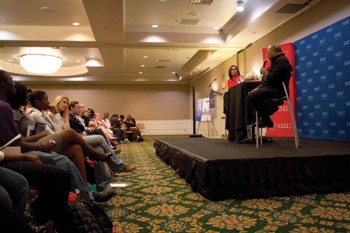
Grammy award winning producer Quincy Jones fields questions from students yesterday in the Hughes-Trigg Ballroom as a part of the Turner Construction/Wachovia Student Forum. The forum gives students a chance to ask Tate lecturers a variety of questions. (Casy Lee)
Quincy Jones was on campus yesterday as the third speaker in this year’s Tate Lecture Series.
Jones treated SMU students and members of the Dallas community to a fast-paced question and answer forum in the afternoon and followed with an evening lecture in the form of a live interview moderated by Robert Wilonsky in McFarlin Auditorium.
The Tate audience greeted Jones with a standing ovation before he began telling his story of growing up in Chicago and then becoming a major international musical icon.
He opened by explaining that it was the 50th anniversary of Frank Sinatra coining the name “Q,” a name that even further pushed Jones down the path of stardom. Jones showed the audience a ring given to him by Sinatra, especially meaningful after the musical legend’s death in 1998.
Many lecturers of the series speak about their accomplishments and the highs and lows of their careers, but Jones spoke with humility as he described his rocky beginnings in life and music career, and how he was able to succeed with a little luck and a lot of talent. He spoke of his dad’s gang activity in the rough streets of Chicago and how it affected his perspectives as a young boy.
An important aspect of the lecture was when Jones explained that his obsession with music began after stealing lemon meringue pie from an armory as a child. He recalled that after he had stolen and eaten the pie, he went back to play the piano he’d noticed in the room. Jones said from that day forward, he knew every cell in his body would push him to learn more about music and begin a career in the music industry.
His coming of age story as a child struggling to find his place on the Chicago streets to his camaraderie with Ray Charles and the adversity they faced as two young black men who tried to make better lives for themselves. It ended with a recap of important musicians he’s performed with, to the long lasting effects of his music and the voice that it gave to him and his friends.
When asked what some high and low points were of his career, Jones responded by saying he could not pick a high point among performing with some of music’s greats, his relationship with Ray Charles, his personal successes and his career triumphs. After this question, Wilonsky announced the conclusion of the lecture and the audience thanked Jones with a lengthy standing ovation.
Up next in the Tate line-up is Phillipe de Montebello, the longest-serving director of the Metropolitan Museum of Art on Dec. 2. Tickets are available through the SMU website, smu.edu/tateseries/tickets/.








